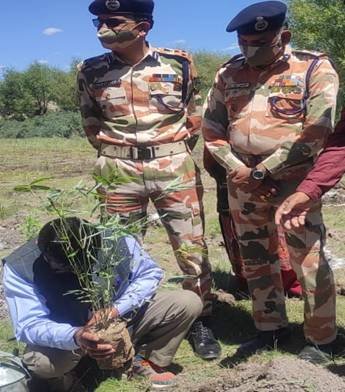Speed Post News Network
New Delhi : In a historic move, Khadi and Village Industries Commission (KVIC) on August 18, 2021, launched the first ever initiative to develop green cover over barren lands in the Himalayan terrains of Leh-Ladakh by planting bamboo saplings.
In a joint exercise, KVIC and the Forest Department of Leh-Ladakh with support from ITBP, planted 1,000 bamboo saplings at village Chuchot in Leh over 2.50 lakh square feet of barren forest land that has remained unutilised so far. The bamboo plantation was launched by KVIC Chairman Vinai Kumar Saxena in the presence of local Councillors, Gram Sarpanch and ITBP officials, according toa PIB release.
The development comes three days after the Indian Army planted 20 special bamboo saplings at its compound in Leh which were gifted by KVIC. Bamboo saplings have been planted under Project BOLD (Bamboo Oasis on Lands in Drought) of KVIC, which is aligned with the Prime Minister’s call for preventing desertification, protecting land and environment, and ensuring food security. Project BOLD is a part “Khadi Bamboo Festival” designed to celebrate “Azadika Amrit Mahotsav”.
This bamboo patch in Leh will create a sustainable model of development by supporting local rural as well as bamboo-based industries. A large quantity of Agarbatti is used in monasteries which are largely brought from other states. These Bamboo trees can be used for developing local Agarbatti industry in Leh. It will further support other bamboo-based industries such as furniture, handicraft, musical instruments, and paper pulp and create sustainable employment for locals.
The bamboo waste can be used in making charcoal and fuel briquette that will ensure fuel availability during harsh winters in Leh. Also, Bamboos emit 30% more oxygen than other plants which is an added advantage in high altitude regions which is always short of oxygen.
KVIC Chairman Saxena said the experiment of bamboo plantation in Leh was a challenging task given the difficult geographical conditions in the region. “In Leh, a vast area of land has remained unutilised for hundreds of years. As a result, even the black soil in the region has turned into rocks at most of these places. This made the digging of pits for bamboo plantation an extremely challenging task for KVIC. While digging the pits, these hard lumps were crushed and filled in the pits to provide a soft ground for bamboo roots to grow,” he said.
“Further, KVIC has chosen the monsoon season for bamboo plantation in Leh so that the plants get ample time to develop a root system and become hard enough to survive the snow fall and freezing wind in coming months,” Saxena said and added that if even 50 to 60 percent of bamboos survived, KVIC would carry out bamboo plantation on a largescale in Leh-Ladakh region next year.
Under Project BOLD, KVIC has so far planted 12,000 bamboo saplings (including 1,000 in Leh) over 17.37 lakh square feet of arid land at four places – village Nichla Mandwa in Udaipur, village Dholera in Ahmadabad, village Tanot in Jaisalmer, and village Chuchot in Leh.
